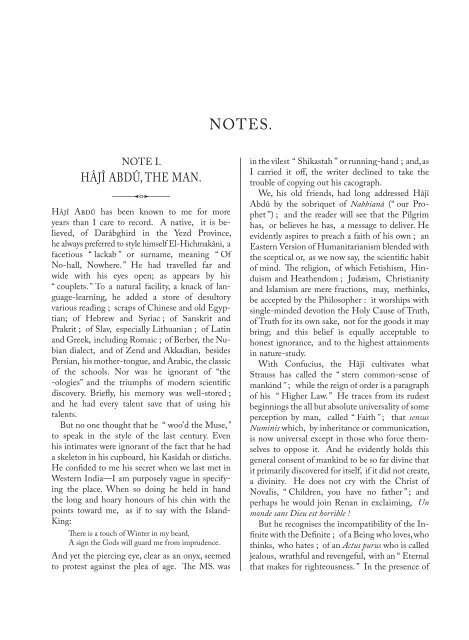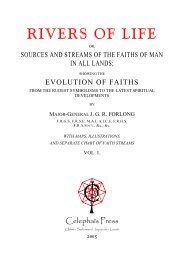You also want an ePaper? Increase the reach of your titles
YUMPU automatically turns print PDFs into web optimized ePapers that Google loves.
NOTE I.<br />
HÂJÎ ABDÛ, THE MAN.<br />
<br />
Hâjî Abdû has been known to me for more<br />
years than I care to record. A native, it is believed,<br />
of Darâbghird in the Yezd Province,<br />
he always preferred to style himself El-Hichmakâni, a<br />
facetious “ lackab ” or surname, meaning “ Of<br />
No-hall, Nowhere. ” He had travelled far and<br />
wide with his eyes open; as appears by his<br />
“ couplets. ” To a natural facility, a knack of language-learning,<br />
he added a store of desultory<br />
various reading ; scraps of Chinese and old Egyptian;<br />
of Hebrew and Syriac ; of Sanskrit and<br />
Prakrit ; of Slav, especially Lithuanian ; of Latin<br />
and Greek, including Romaic ; of Berber, the Nubian<br />
dialect, and of Zend and Akkadian, besides<br />
Persian, his mother-tongue, and Arabic, the classic<br />
of the schools. Nor was he ignorant of “the<br />
-ologies” and the triumphs of modern scientifi c<br />
discovery. Briefl y, his memory was well-stored ;<br />
and he had every talent save that of using his<br />
talents.<br />
But no one thought that he “ woo’ d the Muse, ”<br />
to speak in the style of the last century. Even<br />
his intimates were ignorant of the fact that he had<br />
a skeleton in his cupboard, his Kasîdah or distichs.<br />
He confi ded to me his secret when we last met in<br />
Western India—I am purposely vague in specifying<br />
the place. When so doing he held in hand<br />
the long and hoary honours of his chin with the<br />
points toward me, as if to say with the Island-<br />
King:<br />
ere is a touch of Winter in my beard,<br />
A sign the Gods will guard me from imprudence.<br />
And yet the piercing eye, clear as an onyx, seemed<br />
to protest against the plea of age. e MS. was<br />
NOTES.<br />
—————————————————————————————————————<br />
in the vilest “ Shikastah ” or running-hand ; and, as<br />
I carried it off , the writer declined to take the<br />
trouble of copying out his cacograph.<br />
We, his old friends, had long addressed Hâjî<br />
Abdû by the sobriquet of Nabbianâ (“ our Pro-<br />
phet ”) ; and the reader will see that the Pilgrim<br />
has, or believes he has, a message to deliver. He<br />
evidently aspires to preach a faith of his own ; an<br />
Eastern Version of Humanitarianism blended with<br />
the sceptical or, as we now say, the scientifi c habit<br />
of mind. e religion, of which Fetishism, Hinduism<br />
and Heathendom ; Judæism, Christianity<br />
and Islamism are mere fractions, may, methinks,<br />
be accepted by the Philosopher : it worships with<br />
single-minded devotion the Holy Cause of Truth,<br />
of Truth for its own sake, not for the goods it may<br />
bring; and this belief is equally acceptable to<br />
honest ignorance, and to the highest attainments<br />
in nature-study.<br />
With Confucius, the Hâjî cultivates what<br />
Strauss has called the “ stern common-sense of<br />
mankind ” ; while the reign of order is a paragraph<br />
of his “ Higher Law. ” He traces from its rudest<br />
beginnings the all but absolute universality of some<br />
perception by man, called “ Faith ” ; that sensus<br />
Numinis which, by inheritance or communication,<br />
is now universal except in those who force themselves<br />
to oppose it. And he evidently holds this<br />
general consent of mankind to be so far divine that<br />
it primarily discovered for itself, if it did not create,<br />
a divinity. He does not cry with the Christ of<br />
Novalis, “ Children, you have no father ” ; and<br />
perhaps he would join Renan in exclaiming, Un<br />
monde sans Dieu est horrible !<br />
But he recognises the incompatibility of the Infi<br />
nite with the Defi nite ; of a Being who loves, who<br />
thinks, who hates ; of an Actus purus who is called<br />
jealous, wrathful and revengeful, with an “ Eternal<br />
that makes for righteousness. ” In the presence of






![[PDF] Prolegomena](https://img.yumpu.com/16774951/1/190x245/pdf-prolegomena.jpg?quality=85)










